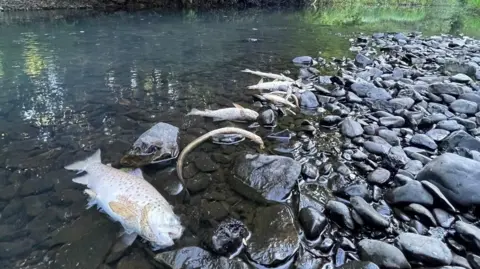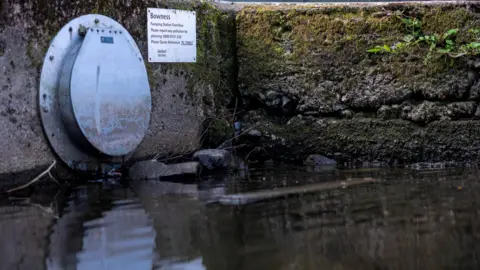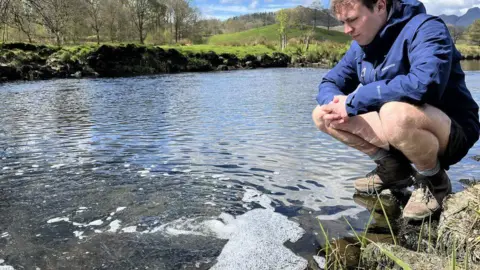Water quality monitors 'fail to detect sewage'
 Matt Staniek
Matt StaniekWater quality monitors installed in response to toxic pollution near England's largest lake are ineffective, campaigners have claimed.
The Environment Agency (EA) installed the monitors at Cunsey Beck, which feeds into Windermere in the Lake District, after a fish kill in June 2022 in which "100% of life" within the river was suspected to have died.
Save Windermere campaigners claimed a test they carried out using non-toxic dye showed the equipment was wrongly placed, meaning it could not pick up flow coming from a nearby sewage pipe.
The Environment Agency said while it was "always happy to listen to concerns", it was "confident" the monitors had been placed correctly.
Since the equipment, known as sondes, was installed, the campaign group questioned its positioning twice before, resulting in the EA moving it.
The sondes are placed upstream and downstream of Near Sawrey Wastewater Treatment Works - managed by United Utilities - which discharges into Cunsey Beck.
 Reuters
ReutersMatt Staniek, a founder of Save Windermere, said: "What they're trying to do with it, is they're trying to identify point sources of pollution, but that's where the issue has arisen - the placing of them is just inappropriate."
He said the group placed fluorescent dye where sewage entered the beck and observed the dyed water not passing the sonde.
"This means any sewage spills from Near Sawrey - a prime suspect in the fish kill and the main cause for concern on Cunsey Beck - would go undetected by the EA's monitor," he added.
 Reuters
ReutersThe EA said more information on how and when the test was carried out would be needed to determine its relevance.
A spokesman added the agency had reviewed all United Utilities permits for Windermere in 2024 and told the company "stricter environmental standards were needed", leading to the firm to treble its initial planned investment.
Water companies can release untreated sewage when it rains heavily to stop homes from being flooded, but the practice has been heavily criticised, including at Windemere.
'Better monitoring needed'
Save Windermere said it believed monitors should analyse what is discharged into the water before it enters Cunsey Beck, rather than attempting to monitor the water after discharges or spills.
Mr Staniek added water companies only monitor how long raw sewage has been spilled, but not how much has entered the water.
"We're talking about very easy changes, which not only mean water companies become more accountable, it means we can better monitor pollution," he said.
United Utilities said it was delivering £200m of investment in the catchment "to treat wastewater to even higher standards".
A spokesman said work would "significantly reduce discharges into the lake" and introduce more water quality monitoring.
'Protecting Windermere'
Mr Staniek said a "sewage-free Windermere" was "absolutely achievable", but a government drive was needed to implement changes.
"What I want to leave behind is a lake that's cleaner than when I found it, for me it's really about providing a voice for the wildlife that calls Windermere home and can't speak against this exploitation.
"The knock-on effect if you prioritise the ecology first and foremost is that it then protects Windermere for recreational use, it protects Windermere for its cultural significance, it protects local business that relies on a clean and healthy Windermere."
 Jonah Fisher/BBC
Jonah Fisher/BBCA Defra spokesman said the government "will never look the other way" while water companies "pump record levels of sewage" into water courses.
They added: "We have wasted no time in placing water companies under special measures through the Water Bill, which includes new powers to ban the payment of bonusses for polluting water bosses and bring criminal charges against lawbreakers.
"We have also launched the largest review of the water sector since privatisation to attract the investment we need to clean up our waterways for good."
Follow BBC Cumbria on X, Facebook, Nextdoor and Instagram. Send your story ideas to [email protected].
